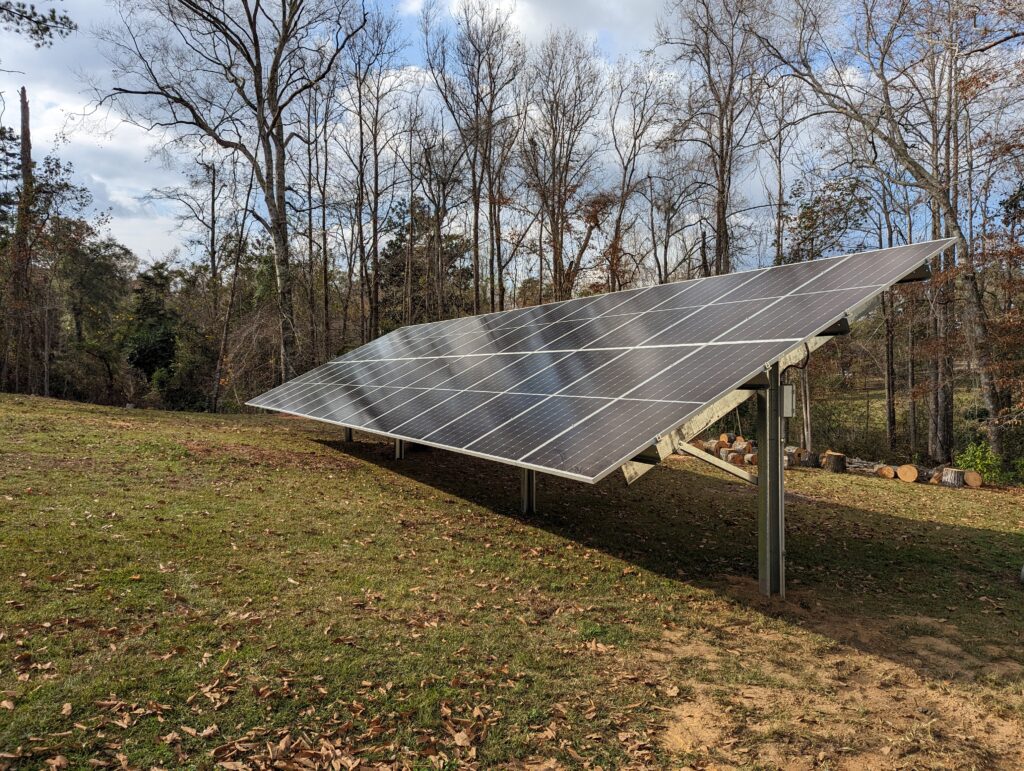The allure of off-grid living has never been stronger, especially with the latest advancements in solar technology and the decreasing costs of batteries. At Georgia Solar Pros, we’ve noticed an increased interest in this approach and have helped several customers achieve these aspirations of becoming fully energy independent. However it should be noted that transitioning your home to complete off-grid living is a considerable undertaking. It involves not just a financial investment but also a deliberate adjustment in lifestyle to ensure its effectiveness.
The Financial and Lifestyle Implications of Off-Grid Living
Opting for an off-grid lifestyle usually means prioritizing self-reliance and energy independence over immediate cost savings. For most homeowners with access to the grid, fully transitioning to off-grid living is not a path to financial savings, particularly when compared to standard grid power or even grid-tied and hybrid solar systems. Off-grid solutions are more cost-effective for smaller or remote setups where connecting to the grid is not viable. However, for the average residential home, shifting to a completely off-grid system involves a considerable initial investment, driven more by the desire for autonomy and a reliable power source than by financial incentives.
Understanding the Sizing and Complexity of Off-Grid Systems
Off-grid systems require careful sizing to ensure uninterrupted power, as they must operate 24/7/365. Off grid designs must include::
- Larger Solar Arrays: These are necessary to account for reduced production on cloudy days.
- Expanded Battery Storage: Essential for powering your home through the night and during periods with less sunlight.
- Backup Power Solutions: A generator or an alternative backup source is crucial, especially during prolonged periods of poor weather. Even in off-grid setups, some form of grid connection can be a useful backup.
- Centralized Power Systems: For larger off-grid homes or those seeking complete self-sufficiency, centralized power systems are critical. Centralizing components like batteries, inverters, and generators in a dedicated space improves maintenance, safety, and scalability.
Costs Involved in Going Off the Grid
Transitioning to a fully off-grid system is a substantial investment. For an average-sized home with power bills averaging $150-$400/month, installed costs on a fully autonomous off grid power system can range from $90,000 to $175,000, depending on the home’s size and energy requirements. Larger energy needs result in higher costs due to the scale of solar arrays, battery storage, and backup systems needed.
Practical Strategies for Achieving Off-Grid Living
Living off-grid with a large system allows for a normal lifestyle, but there are strategies to make it more achievable and budget-friendly:
- Adjust Energy Usage: Adapt your consumption to match weather patterns, using more power during sunny periods and conserving when it’s cloudy.
- Invest in Home Efficiency: Enhancing your home’s energy efficiency through better insulation, energy-efficient appliances, and smart technologies can ease the transition.
- Utilize Backup Power: Depending on backup sources like generators or a partial grid connection can reduce the need for a large battery bank but may impact your level of independence.
Thinking About Off-Grid Living?
Embarking on the off-grid journey is empowering but requires a thorough understanding of the associated costs, logistical needs, and lifestyle changes. At Georgia Solar Pros, we’re dedicated to guiding you through this process, ensuring your move to off-grid living is well-informed, smooth, and customized to your specific requirements. For an off-grid system that aligns with your lifestyle and energy objectives, reach out to Georgia Solar Pros here.
About Us
Georgia Solar Pros specializes in tailor-made solar solutions, ranging from standard grid-tied setups to intricate, large-scale off-grid systems. We focus on your need for independence, sustainability, and peace of mind. Discover your options with us, as we help you navigate the path to energy independence.

